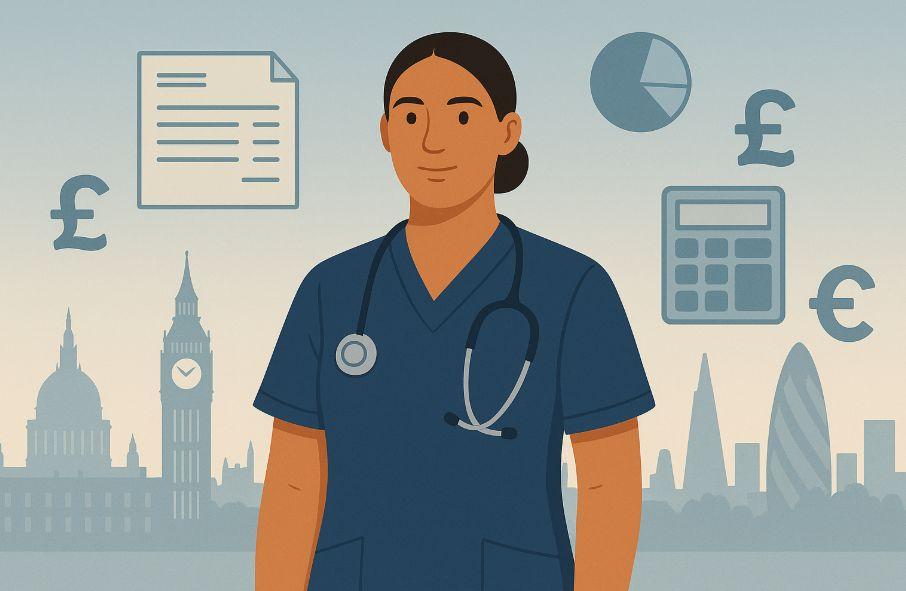Have you ever wondered why an NHS Band 7 salary looks impressive on paper but feels very different once it hits your bank account? Many Band 7 professionals especially those navigating London’s rising living costs quickly discover that the journey from gross pay to take-home pay is more complicated than it seems. And with the 2025/2026 period bringing renewed attention to NHS pay scales, understanding exactly where your money goes has never been more important.
Between tax deductions, National Insurance, pension contributions and the often misunderstood High-Cost Area Supplement (HCAS), the real value of a Band 7 salary can surprise even experienced NHS staff. This guide breaks everything down clearly and accurately, giving you a realistic picture of what Band 7 employees actually take home each month without needing constant annual updates.
What Is the Current NHS Band 7 Salary?

Band 7 roles cover many senior clinical and leadership positions such as Clinical Nurse Specialists, Senior Radiographers, Advanced Practitioners, Ward Managers and mental health leads. These posts require advanced practice, responsibility and autonomy.
The current Agenda for Change Band 7 salary structure is:
| Band 7 Pay Point | Annual Salary |
|---|---|
| Entry point | Around £45,000+ |
| Typical mid-point | Around £47,000–£48,000 |
| Top of Band 7 | Around £51,000+ |
In London, staff also receive the High-Cost Area Supplement. HCAS is paid at three levels:
- Inner London: 20% of basic salary (up to a capped amount)
- Outer London: 15%
- Fringe: 5%
For a full-time Band 7 working in central London, this supplement adds several thousand pounds per year, often pushing the total gross salary close to or above £59,000 depending on pay point.
How Much Tax and National Insurance Is Deducted?
Take-home pay depends heavily on the UK’s current tax and NI structure. Income tax is charged at 20% on earnings above the personal allowance up to the higher-rate threshold, and 40% on earnings above that. Because HCAS increases taxable pay, many Band 7 staff in London pay some higher-rate tax.
National Insurance contributions are charged at the current main rate up to the upper threshold, and at a lower rate above that level.
Band 7 staff also contribute a percentage of their pay to the NHS Pension Scheme. Although this is one of the largest deductions, it forms part of a highly valuable, government-backed, inflation-linked pension.
What Is the Monthly Take-Home Pay for NHS Band 7?
To understand what actually arrives in a Band 7 employee’s bank account, it’s useful to break down the main deductions.
For a Band 7 in inner London receiving the full HCAS allowance, the typical gross monthly pay is close to £5,000. After tax, NI and pension deductions, most Band 7 employees take home between £3,600 and £3,750 each month, depending on where they sit on the pay scale.
Below is an example calculation for someone at the upper end of Band 7 with Inner London HCAS:
Estimated Monthly Band 7 Take-Home Pay
| Monthly Breakdown | Amount |
|---|---|
| Gross (Basic + HCAS) | ~£4,900–£5,000 |
| Income Tax | ~£500+ |
| National Insurance | ~£340–£360 |
| NHS Pension Contribution | ~£450–£470 |
| Estimated Take-Home Pay | £3,600–£3,750 |
Actual take-home pay will vary slightly based on tax codes, pension tier, and whether overtime or enhancements apply.
How Does the NHS Pension Influence Take-Home Pay?

NHS pension contributions slightly reduce disposable income each month, but they remain one of the strongest long-term benefits of NHS employment. Band 7 staff contribute a percentage of their pensionable salary, which often amounts to £430–£470 per month.
In return, employees benefit from a defined-benefit scheme offering:
- Indexed, inflation-protected retirement income
- Survivor and dependants’ benefits
- Death-in-service cover
- Annual revaluation of pensionable earnings
- Strong long-term security compared with private pensions
For many Band 7 professionals, this long-term value outweighs the short-term effect on take-home pay.
What Additional Benefits Do Band 7 Employees Receive?
Alongside their salary, Band 7 employees enjoy a comprehensive benefits package that significantly increases the overall value of the role. Annual leave starts at 27 days and increases with length of service. Staff also benefit from enhanced sick pay, maternity/paternity support, continuous professional development and access to employer-funded training.
London-based employees receive HCAS on top of their salary, which recognises the high cost of living. Many Band 7 roles also offer overtime or unsocial hours payments, depending on service needs.
These benefits combined with job security and pension value provide meaningful advantages over many private-sector positions.
How Can You Work Out Your Band 7 Take-Home Pay?
To calculate your exact take-home pay, you can use online tools such as NHS Pay calculators or salary estimation sites. These allow you to enter your Band, pay point, HCAS level, pension tier, and tax code to receive a precise breakdown.
A manual calculation involves subtracting income tax, NI and pension contributions from your gross monthly salary. For most Band 7 employees in London, this reliably results in a take-home range of £3,600–£3,750 per month.
What Responsibilities Come With Band 7 Roles?

Band 7 roles represent senior clinical or managerial responsibility. Staff at this level typically manage complex caseloads, lead specialist services, supervise junior staff, and contribute to audits and service development.
Common Band 7 positions include Clinical Nurse Specialists, Senior Physiotherapists, Ward Managers, Advanced Practitioners, Senior Radiographers and team leaders across mental health, emergency care and community services.
These positions require high levels of autonomy, expertise and leadership, reflecting their position within the NHS structure.
Is a Band 7 Salary Financially Competitive in London?
Despite the high cost of living in London, a Band 7 salary remains competitive when including HCAS, pension value, job security and progression opportunities. While Band 7 pay is not as high as some private-sector roles, NHS benefits such as enhanced leave, structured career growth, overtime payments and a strong pension provide considerable long-term value.
For many healthcare professionals, Band 7 offers a balanced package of income, stability and career opportunity.
How Does Band 7 Compare With Other NHS Bands?
Band 7 represents a key advancement point, sitting above Band 6 and just below Band 8a. While Band 6 roles carry responsibility, Band 7 positions involve a much higher level of clinical judgement, managerial oversight and specialist expertise.
Band 8a roles, which sit above Band 7, involve strategic leadership and service management and come with a meaningful salary increase. Band 7 is often regarded as the gateway to these more senior roles.
Will NHS Band 7 Salaries Increase in the Near Future?

NHS Band 7 salaries are likely to see gradual increases over time, mainly driven by annual recommendations from the NHS Pay Review Body. Rising living costs, staff shortages, and continued pressure from trade unions make further adjustments increasingly likely.
However, any increases are usually modest and depend on government funding and wider public-sector budget constraints. Band 7 staff can generally expect steady, incremental improvements rather than large pay jumps. Overall, the outlook suggests slow but continued upward movement in NHS Band 7 pay.
Conclusion
NHS Band 7 roles offer strong earning potential, especially when London weighting is included. Despite the impact of tax, National Insurance and pension deductions, most Band 7 staff working in London take home between £3,600 and £3,750 per month.
Combined with a respected pension scheme, generous leave, and stable career progression, Band 7 positions continue to offer a valuable and secure career pathway for experienced NHS professionals.
FAQs About NHS Band 7 Pay
What is the starting salary for NHS Band 7 in 2024?
The starting salary is £43,742, rising with experience to £50,056, before any additional supplements.
How much do Band 7 nurses really take home monthly?
A typical Band 7 nurse in London takes home around £3,700–£3,800 per month after tax, NI, and pension contributions.
Is there extra pay for NHS staff working in London?
Yes, the High-Cost Area Supplement can add up to 20% to the base salary, depending on location within London.
Can Band 7 employees opt out of NHS pension?
Yes, opting out is possible, though not usually advisable due to the long-term value of the NHS pension scheme.
Do NHS Band 7 staff get paid for overtime?
Overtime is often paid at enhanced rates or can be taken as time off in lieu, depending on the employee’s contract.
What’s the difference between gross and net salary in Band 7?
Gross salary refers to the total earnings before deductions; net salary is the amount received after all statutory deductions.
How often does the NHS update its pay bands?
NHS pay bands are typically reviewed and updated annually, often following negotiations with trade unions and government bodies.









Leave feedback about this